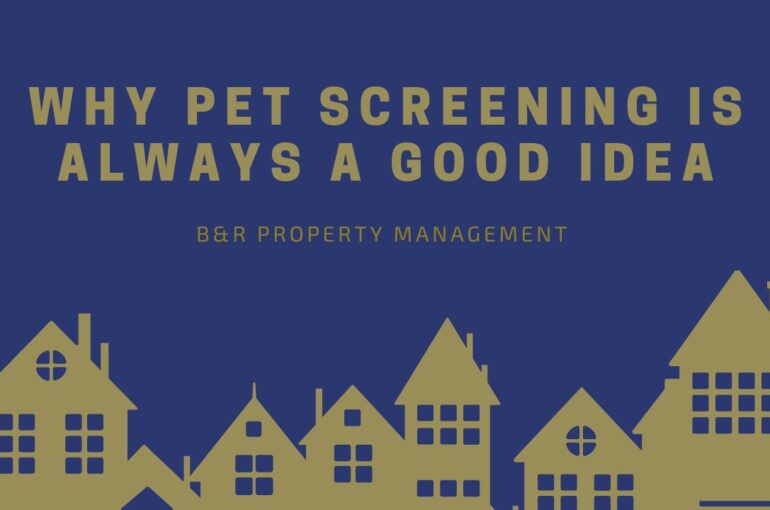Why Pet Screening Is Always a Good Idea
Why Pet Screening Is Always a Good Idea

With pet ownership on the rise, it might be a good idea for landlords to entertain the possibility of turning their rental properties into pet-friendly spaces. Opening your rental to pets can come with a number of benefits, such as increasing your market reach and setting a higher rent.
In order to turn your pet-friendly apartment into a success and reap the benefits that come with it, it’s crucial to establish and conduct a strong pet screening procedure.
Pros of Welcoming Pets into Your Rental Unit
Tenants Are More Likely to Rent Long-Term
Tenants with pets are less likely to hop from one rental space to another, as pets crave being in a familiar environment and moving can be tiring for them. Tenants who see that their pets are comfortable in a specific living space will tend to stay longer. Thus, turning your rental into a welcoming, pet-friendly unit will help you find and attract long-term tenants.
Wider Pool of Applicants
Allowing pets onto your rental property will give you a competitive edge and make your unit stand out over other similar rentals. By choosing to offer pet-friendly features, you can reach a wider pool of applicants and attract potential renters that are looking for properties that’ll let them keep their pets.

Attract More Responsible Tenants
Taking proper care of a pet requires responsibility and organization, as pet owners need to feed and walk their pets regularly, on top of making all the necessary vet visits. If a tenant can take good care of their pet, they’re more likely to be responsible and comply with the rental policies outlined in the lease.
Defining Pet Screening
Before welcoming applicants onto your rental property, landlords take the time to check their rental history and references to ensure they’re a right fit. It’s important to do the same with pets before allowing them inside your rental space. You can either go over the pet screening process yourself or seek the help of a third party professional to screen the pets in your place.
You’ll want to learn more about the pet’s health, personality, and behavior patterns. This will help you know what to expect during the pet’s stay in your rental unit. You can request the pet owner to complete a questionnaire and submit important health screening documents. After, you can plan an in-person meeting to assess the pet yourself.
Pet Screening Process
Questionnaires
As a landlord, you can create a questionnaire designed to acquire vital pet information, such as:
- Type and breed of the pet
- Weight of the pet
- Age of the pet
- Length of pet ownership
- Proof of pet vaccines
- House-training experience
- Pet behavior issues
- Plans of the pet owner to spay or neuter

Depending on the kind of pet the applicant has, you might want to ask specific questions. For example, you might want to ask if a dog has attended any dog training classes, if they’re comfortable wearing a leash, and how their owner cleans after them.
For cats, you may want to ask if the cat usually stays indoors, whether they’re registered or possess any collar or identification, and what their litter box usage is like.
After receiving the application form, you can arrange to meet in-person with the interested renter and their pet.
In-Person Meetings
It’s easy for pets to meet your standards on paper, but it’s always helpful to meet the pet in person before making a final decision. You want to verify the information that was provided on the questionnaire and make an informed decision.
However, it’s important to remember that pets tend to get nervous around new people and may display anxious behavior. If you have little experience interacting with pets, consider engaging the services of a licensed third party.
Pet Clauses to Include in the Lease Agreement
If you rent a pet-friendly unit, your lease agreement should always include the relevant pet policies and clauses. Mention the types of pets allowed in your unit and the kind of pet screening that will be conducted. Be clear and upfront about the fees and/or deposits you’ll be collecting from tenants with pets.

Which Pets Require Screening & Screening Frequency
Remember to be fair and enforce a consistent pet screening procedure for all types of pets. When a tenant opts to renew their lease, it’s important to request for the pet’s updated records. A lot could happen during the tenancy period, so requesting health updates is vital to avoid dealing with potential issues in the future.
Dealing with Pet Fees and Deposits
Since welcoming pets into your property comes with its fair share of risk and expenses, you can protect your property (and investment) by collecting pet fees from your tenants. Conduct thorough research and familiarize yourself with Nevada rental laws prior to setting a pet fee or pet deposit amount.
Landlords can ask renters these types of pet fees:
- Monthly rent: The landlord may charge an additional monthly pet rent.
- Deposit: Aside from the security deposit, a refundable pet deposit may also be required by the landlord at the beginning of the tenancy.
Bottom Line
Having a solid pet screening procedure can help lower the risks of welcoming pets into your rental properties, and turn your rental business into a profitable success.
If you’re looking for a trusted property manager to take care of your pet-friendly rental property, contact B&R Property Management today!



